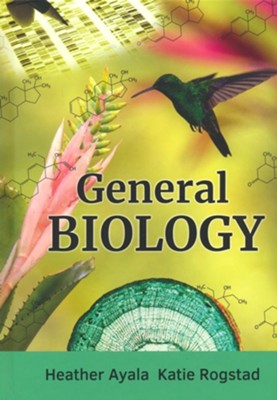
Using Classical Academic Press’s General Biology (Novare Series), we will combine up-to-date science with a Catholic worldview. The textbook starts at the atomic level and progresses to ever larger scales: cells, genes, microorganisms, plants, animals, and human organ systems. The final chapters survey ecology and the theory of evolution.
How to get the most out of Biology with Lab (Novare), Part One with MacBeth Derham:
-
First, read the course materials below before the first class meeting.
-
Then have a notebook ready and available for class notes each live session.
-
Read assignments before class meetings
-
Watch that week’s recording if you need to revisit information from our live session.
-
Do the assignments, quizzes, and any extra work assigned for that week.
-
Once the course is completed to the parent's and professor’s satisfaction, there is a Certificate of Completion at the end to be filled in for your records.
Special Notes: This course is offered in two different day/time slots so you can choose the day and time best for your homeschool. This course starts before Labor Day.
This is Part One of a two-part course. Students are expected to sign up for Part Two in the Spring.
Total Classes: 14
Duration per class: 70 minutes
Prerequisite: None
Suggested Grade Level: 9th to 12th grade
Suggested Credit: One full semester Biology with LAB or Science
Instructor: MacBeth Derham
Instructor Email: macbethderham@gmail.com
Course description: This course will fulfill your high school science credit and prepare you for future science studies. Part One begins with the tools we use to talk about biology, and continues with the nature of molecular structure, increasing by scale to the cellular processes, DNA, classical genetics, and population genetics. The Novare method—learn, master, retain—is the goal of this course for the study of Biology. This course prepares students for ACT/SAT science exams. Students are expected to take notes during class and ask questions. Notes will help with weekly quizzes, as quizzes are open book. Labs are an integral (and required) part of the course; materials are common household items.
Course outline:
Week 1: Biology as a quantitative science—measure!
Week 2: What on Earth is life?
Week 3: Too small to see? History of biogenic science and the atom
Week 4: Organic chemistry, from water to DNA
Week 5: Cell theory
Week 6: Energy and membranes
Week 7: Oxygen, cellular respiration, and energy
Week 8: Photosynthesis
Week 9: Molecular biology
Week 10: The cell cycle through mitosis
Week 11: Meiosis
Week 12: Chromosomes and human genetics
Week 13: Gregor Mendel and Classical Genetics
Week 14: Population genetics
Lab sequence:
1. Osmosis Lab – In this investigation, we will use a hen’s fresh egg to determine what happens during osmosis and diffusion across membranes.
2. Fermentation – We will set up a fermentation in a closed system and capture the generated carbon dioxide to carbonate root beer.
3. Mitosis Flip Book – We are drawing our own moving cell division!
4. Punnett Square – Applying our knowledge of phenotypes and genotypes to complete a worksheet.
5. Genetic Match – Students will determine the presence of certain high-frequency traits in themselves and their family members.
6. DNA Extraction – We will be creating a mixture to extract DNA from a strawberry!
7 M&M Lab – Activity to simulate the process of radioactive decay and to illustrate the concept of half-life.
Course materials: General Biology 1st ed. by Rogstad and Ayala from Novare ISBN: 9781732638433
LAB booklet for purchase at https://amzn.to/3GJkNAq
Homework: Expect to spend approximately two-plus hours each week outside of the classroom on vocabulary study, reading, and quizzes. Vocabulary is assigned alongside the weekly reading for better understanding of the material and to prepare the student for the live lecture. Most of the computer-graded quiz material is based on vocabulary and what is presented in class. The sequence of events for each week is as follows:
1. Read the assigned chapter(s)
2. Write the provided vocabulary words in your notebook
3. Come to class
4. Take the weekly computer-graded quiz
Lab Homework: Students will perform labs at home after class. Labs require ½-1 hours on alternate weeks.
- Teacher: MacBeth Derham